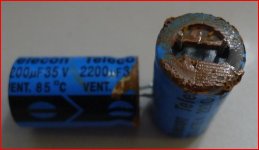Opened up my subwoofer to try and work out what is causing the intermittent popping noise.
nothing looks decidedly suspect other than these cap's
my capacitor tester only goes up to 200uf and these are rated at 2200uf @ 35v so dont have anyway of truly testing them.
but if the leakage is electrolytic fluid then they will need replacing
please have a look at the image and see what you think.
http://img842.imageshack.us/img842/6754/p1000769.jpg
nothing looks decidedly suspect other than these cap's
my capacitor tester only goes up to 200uf and these are rated at 2200uf @ 35v so dont have anyway of truly testing them.
but if the leakage is electrolytic fluid then they will need replacing
please have a look at the image and see what you think.
http://img842.imageshack.us/img842/6754/p1000769.jpg
Life is too short to wait for that image (dial-up here), but remember that electrolytic caps don't have much liquid in them. If you see a brown deposit of any significance, it's glue. If you see something that looks like a dried up white deposit, I'd get suspicious.
Looks like glue to me as well. I'd also recommend replacing them, they don't have to spew electrolyte everywhere to be performing badly. Replace them with some quality equivalents, like Nichicon, Nippon Chemicon, Elna etc.
Unless your capacitor meter shows ESR, it isn't going to help with detecting all but the most catastrophic failures.
my capacitor tester only goes up to 200uf and these are rated at 2200uf @ 35v so don't have anyway of truly testing them.
Unless your capacitor meter shows ESR, it isn't going to help with detecting all but the most catastrophic failures.
I have never seen an audio product's cap leak, but I have seen many computer motherboards and they are usually bulging at the top along with leakage at bottom. It makes sense that the pressure would build internally, cause bulging at the top to a point, then begin leaking from the bung. That dark brown glue is very common. Most likely glue.
Glue, if the electrolyte leaked from the bottom it couldn't have travelled upwards against gravity.
Hi, thanks for the responses I bought a new tester and you were right it was glue however I found out that these caps were largely out of balance where as one read at 2100uf the other was at 2500uf.
cheers, Reidy-
cheers, Reidy-
Sorry, but you misunderstand.
21/22 is about 5% low. 22/25 is about 12% high.
Both well within a 20% tolerance. Even for 10% caps it isn't bad.
21/22 is about 5% low. 22/25 is about 12% high.
Both well within a 20% tolerance. Even for 10% caps it isn't bad.
Hi, thanks for the responses I bought a new tester and you were right it was glue however I found out that these caps were largely out of balance where as one read at 2100uf the other was at 2500uf.
cheers, Reidy-
Sorry to bring bad news but simple capacitor meters that just measure value are of little use in diagnosing problems. As pointed out the tolerance is wide anyway, but the real issue is that cap failure is caused by an increase in ESR.
A good analogy is a 9 volt battery. Whether new or flat, the battery still reads essentially 9 volts off load. What has hapened is that the internal resistance of the battery has increased, and a similar thing happens with electroylitics. You still have a 2200uf or whatever cap, but as it fails it's like a resistor of ever increasing value gets added in series with it.
It's glue, but I would replace them anyway. I would replace them with the largest caps that will fit on the board, maybe 4700u/50v. Always a good idea to go up in value when replacing PS caps, especially in a subwoofer. Also silicone them to the board, as they will be subjected to a lot of vibration.
Dave
Dave
- Status
- Not open for further replies.
- Home
- Design & Build
- Parts
- Capacitor electrolyte or just glue?
